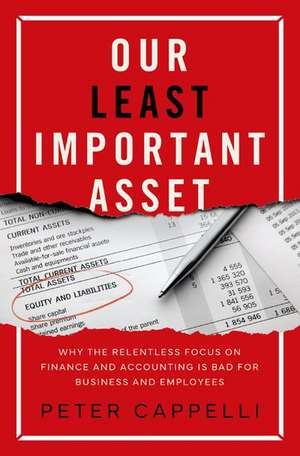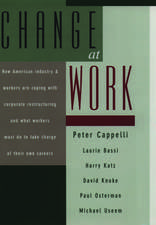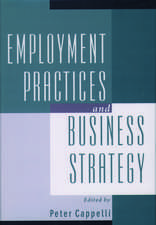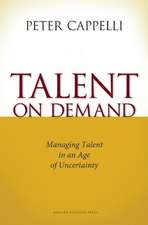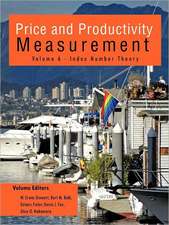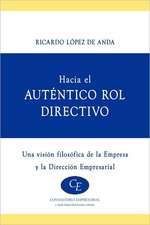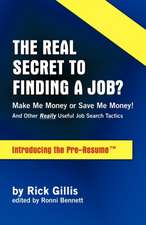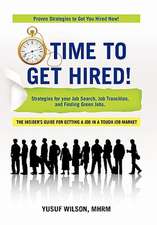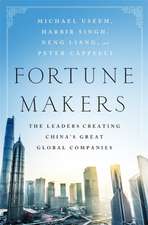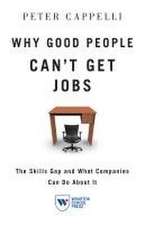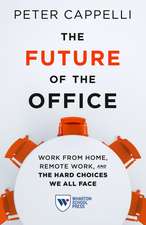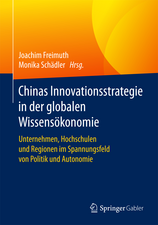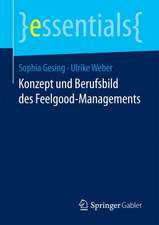Our Least Important Asset: Why the Relentless Focus on Finance and Accounting is Bad for Business and Employees
Autor Peter Cappellien Limba Engleză Hardback – 18 dec 2023
Preț: 155.94 lei
Preț vechi: 178.34 lei
-13% Nou
Puncte Express: 234
Preț estimativ în valută:
29.84€ • 31.04$ • 24.64£
29.84€ • 31.04$ • 24.64£
Carte disponibilă
Livrare economică 14-20 martie
Livrare express 08-14 martie pentru 50.88 lei
Preluare comenzi: 021 569.72.76
Specificații
ISBN-13: 9780197629802
ISBN-10: 0197629806
Pagini: 240
Dimensiuni: 165 x 236 x 24 mm
Greutate: 0.48 kg
Editura: Oxford University Press
Colecția OUP USA
Locul publicării:New York, United States
ISBN-10: 0197629806
Pagini: 240
Dimensiuni: 165 x 236 x 24 mm
Greutate: 0.48 kg
Editura: Oxford University Press
Colecția OUP USA
Locul publicării:New York, United States
Recenzii
...a timely study that connects present-day labor shortages to the dehumanizing irrationality of the modern workplace.
How and why are corporate jobs getting worse and worse over time? Peter Cappelli's latest book answers both these questions: corporations are pushed by accounting demands to squeeze employment costs and to rely on contractors and outsourcing to keep these costs off their books-even at the expense of HR practices supported by decades of research and experience. Our Least Important Asset is an arresting take on the source of our current employment malaise.
Human capital expert Peter Cappelli has written an important new book addressing the fundamental question of why policies that value and build human capital are not only rare in practice but increasingly implemented. His insightful answer: financial accounting measures lead to a lose-lose situation in which companies and their employees suffer. Just as the ESG movement has broadened reporting, so the answer to improved productivity and employee wellbeing must begin in changes in accounting measures.
Peter Cappelli, one of the leading scholars of workforce management, offers a compelling explanation of the decline of human resource practices like careful hiring and performance evaluation and investment in training. Corporate fixation with shareholder value maximization operationalized through financial accounting practices has turned employees from a perceived asset to a liability. Cappelli's probing analysis shows that the popular bromide of convincing corporate leaders 'to do well by doing good' is not sufficient to stem the erosion of work. That makes Our Least Important Asset a must read for those who care about the future of work and workers.
A thought-provoking and important study for managers or faculty and students in business and management programs.
Cappelli's book is based on decades of research and experience in human resource management. He draws on a wealth of empirical evidence and case studies to illustrate his points. Cappelli's book is based on decades of research and experience in human resource management. He draws on a wealth of empirical evidence and case studies to illustrate his points. Highly recommended. All readership levels.
How and why are corporate jobs getting worse and worse over time? Peter Cappelli's latest book answers both these questions: corporations are pushed by accounting demands to squeeze employment costs and to rely on contractors and outsourcing to keep these costs off their books-even at the expense of HR practices supported by decades of research and experience. Our Least Important Asset is an arresting take on the source of our current employment malaise.
Human capital expert Peter Cappelli has written an important new book addressing the fundamental question of why policies that value and build human capital are not only rare in practice but increasingly implemented. His insightful answer: financial accounting measures lead to a lose-lose situation in which companies and their employees suffer. Just as the ESG movement has broadened reporting, so the answer to improved productivity and employee wellbeing must begin in changes in accounting measures.
Peter Cappelli, one of the leading scholars of workforce management, offers a compelling explanation of the decline of human resource practices like careful hiring and performance evaluation and investment in training. Corporate fixation with shareholder value maximization operationalized through financial accounting practices has turned employees from a perceived asset to a liability. Cappelli's probing analysis shows that the popular bromide of convincing corporate leaders 'to do well by doing good' is not sufficient to stem the erosion of work. That makes Our Least Important Asset a must read for those who care about the future of work and workers.
A thought-provoking and important study for managers or faculty and students in business and management programs.
Cappelli's book is based on decades of research and experience in human resource management. He draws on a wealth of empirical evidence and case studies to illustrate his points. Cappelli's book is based on decades of research and experience in human resource management. He draws on a wealth of empirical evidence and case studies to illustrate his points. Highly recommended. All readership levels.
Notă biografică
Peter Cappelli is the George W. Taylor Professor of Management at The Wharton School of the University of Pennsylvania and Director of Wharton's Center for Human Resources. He is also a Research Associate at the National Bureau of Economic Research in Cambridge, MA, served as Senior Advisor to the Kingdom of Bahrain for Employment Policy from 2003-2005, was a Distinguished Scholar of the Ministry of Manpower for Singapore, and was Co-Director of the U.S. Department of Education's National Center on the Educational Quality of the Workforce from 1990-1998. He was recently named by HR Magazine as one of the top 5 most influential management thinkers, by NPR as one of the 50 influencers in the field of aging, and was elected a fellow of the National Academy of Human Resources. He is a regular contributor to The Wall Street Journal and writes a monthly column for HR Executive magazine. His work on performance management, agile systems, and hiring practices, and other workplace topicsappears in the Harvard Business Review.
